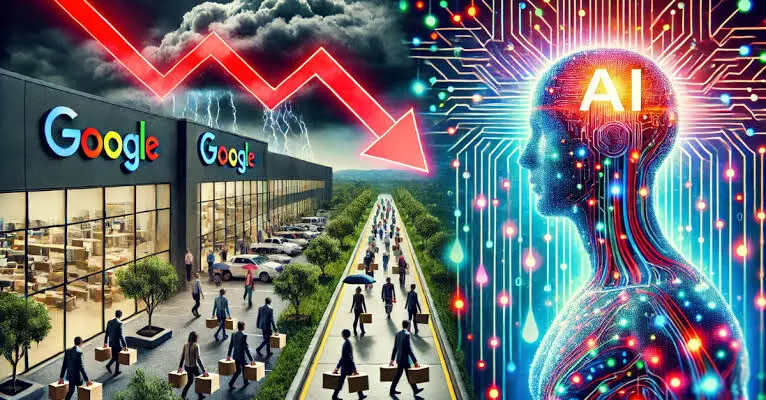Google Layoffs Reveal Harsh Reality of Capitalist Tech Economy in AI Age

In a move that has sent ripples across the global tech ecosystem, Google has laid off hundreds of employees from its Android, Pixel, and Chrome departments. This comes amid its broader strategy to streamline operations and improve cost efficiency—despite its continued investment in Artificial Intelligence (AI) infrastructure. While the corporate spin speaks of becoming “more nimble,” the human cost of this decision cannot be ignored, particularly in a world already reeling under economic precarity and widening wealth disparities.
This layoff follows the voluntary exit programme initiated by Google in January 2025, which targeted senior-level staff in People Operations and the Cloud division. It offered lucrative severance—up to 14 weeks of salary, plus an additional week per year of service. But voluntary or not, the message is clear: Google is trimming down, and not because it lacks resources, but because it wants to redirect them, with sharper focus, toward automation and high-efficiency outputs.
The layoff decision is being defended as a byproduct of the 2024 merger between Google’s Platforms and Devices teams. A spokesperson stated, “Since combining the Platforms and Devices teams last year, we've focused on becoming more nimble and operating more effectively.” Yet, the irony lies in the fact that this “efficiency” comes at the cost of hundreds of livelihoods.
What drives such decisions in today's tech economy is not scarcity, but maximization of capital. Despite being one of the most profitable tech giants in the world, Google is under pressure to optimize margins and impress shareholders. Anat Ashkenaz, the company’s new Chief Financial Officer, has been candid about the push for better cost efficiency.
In pursuit of this, internal reshuffling has also taken place in the Cloud division, where multiple operational support roles were downsized or moved to cheaper global hubs in India and Mexico City. This trend of geographical reallocation reflects a classic cost-minimization strategy—a hallmark of global capitalism. It’s not just about saving money but about getting the same work done for a fraction of the cost.
But herein lies the contradiction: at a time when Google and other Big Tech firms are investing billions into building AI infrastructure, one would expect new job creation, not mass retrenchment. So, what is actually happening?
Technological Advancement vs Human Displacement
There is little doubt that automation and AI are disrupting conventional employment models. Every technological leap historically comes with displacement—just as the industrial revolution replaced artisans, and computers made clerical jobs redundant. Now AI is gradually rendering even cognitive and white-collar roles vulnerable.
In Google's case, the infusion of AI into everything—from search optimization to hardware production—is changing the game. Tasks that once required human intervention in coding, testing, and customer service are now being handled, at least in part, by AI systems. Internal communication may describe this as “streamlining,” but what it essentially reflects is a reduced dependence on human labour.
However, the crucial issue here is the speed and scale of the transition. In the past, industrial shifts offered time for economic reabsorption. Today’s pace, driven by profit-maximizing algorithms and global investor pressure, leaves little room for the working class to adapt. This is not a natural consequence of innovation, but a structural decision dictated by capital.
Senior journalist Kevin Roose, in his book Future proof, warned that the next wave of AI-induced automation might not create more jobs, but fewer, and mostly in precarious gig-based or contract forms. Google's layoffs are a stark reminder that even the most skilled employees in highly valued departments are not safe in a tech economy designed around capital accumulation and labor minimization.
The Human Cost in a Capitalist Tech Economy
Beneath the corporate strategy lies the stark reality faced by those now jobless. These are not just statistics on a quarterly balance sheet—they are lives disrupted, families thrown into uncertainty, and professionals pushed into a saturated job market.
In an economy centered around capital, the value of human labor has become increasingly conditional. Employees are celebrated as “assets” when times are good but discarded as “cost centers” when margins tighten. This commodification of labor is at the heart of capitalism, particularly in the tech sector where scalability often trumps stability.
Moreover, the layoffs point to a deeper systemic issue: the lack of social safety nets and ethical restructuring in times of change. While Google offered severance packages, many contract workers and junior staff—often from underrepresented communities—lack such support. As the company consolidates power and influence through AI and Cloud dominance, the distribution of its profits becomes even more skewed.
Political economist Richard Wolff has long argued that capitalism’s flaw is not that it produces wealth, but that it concentrates it. The workforce builds the value, but when decisions are made, they are not consulted—only informed.
The question isn't whether technology should evolve—it inevitably will. But what kind of evolution do we want? One where progress serves only the shareholders and executives, or one that includes the very workers who help build it?
Google's recent actions exemplify a growing dilemma in the global economy: how to balance technological advancement with human dignity. It is not enough for tech companies to boast about AI breakthroughs if the consequence is job erosion and economic insecurity.
Governments and civil society must step in to ensure that tech-led growth is accompanied by policies for re-skilling, social protection, and ethical restructuring. The alternative is a future where efficiency is achieved at the cost of empathy—and where innovation is celebrated even as livelihoods crumble.
The laid-off Google employees are not victims of failure, but of success—success defined by a capitalist model that often measures progress not by the lives it uplifts, but by the costs it cuts. And unless we confront this paradox, the AI age might just become another chapter in the long history of inequality—this time, engineered by the very machines we built to make life better.
